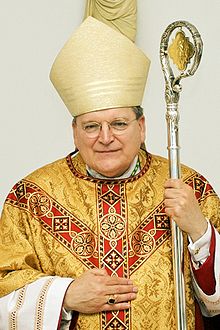Raymond Leo Burke
American Catholic cardinal
Raymond Leo Burke (June 30, 1948 –) is an American archbishop and cardinal of the Roman Catholic Church.

Quotes
edit- The synod that will begin tomorrow conceals an agenda that is more political and human than ecclesial and divine. The will is to profoundly change the hierarchical constitution of the Church is clear, with a further consequence a weakening of teaching on morality as well as discipline in the Church.
- Cardinal Burke: “Synodality contradicts the true identity of the Church” (October 8, 2023)
- The Catholic Church is a church that has one faith, one sacramental system, and one discipline throughout the whole world, and therefore we’ve never thought that each part of the world would define the Church according to particular cultures.
- A GERMAN ATTACK ON CHRIST’S LORDSHIP (September 27, 2019)
- The idea of a one-world government is fundamentally the same phenomenon that was displayed by the builders of the Tower of Babel who presumed to exercise the power of God on earth to unite heaven with earth, which is simply incorrect. What we truly need is a religious conversion, in other words, a strong teaching and practice of faith in God and obedience to the order with which He has created us.
- This situation leads me to reflect more and more on the message of Our Lady of Fatima, who warns us against the evil—one even more serious than the very serious evils suffered because of the propagation of atheistic Communism—of apostasy from the faith in the Church. Paragraph 675 of the Catechism of the Catholic Church teaches us that ‘Before Christ’s second coming the Church must pass through a final trial that will shake the faith of many believers,’ and that ‘the persecution that accompanies her pilgrimage on earth will unveil the ‘mystery of iniquity’ in the form of a religious deception offering men an apparent solution to their problems at the price of apostasy from the truth.’ In such a situation, the bishops and the cardinals have the duty to proclaim true doctrine. At the same time, they have the duty to lead the faithful to make reparation for offenses against Christ and for the wounds inflicted on His Mystical Body, the Church, when the faith and discipline are not preserved correctly and promoted by her pastors. If the Pope does not perform his duty for the good of all souls, it is not only possible but also necessary to criticize the Pope. This criticism must follow Christ’s teaching about fraternal correction in the Gospel (Mt. 18:15-18). First, the lay person or the pastor must express his criticism privately, which will allow the Pope to correct himself. But if the Pope refuses to correct his seriously defective way of teaching or acting, the criticism must be made public, because the common good in the Church and in the world is at stake. Some have denounced those who have addressed their criticism to the Pope publicly, as though it were a display of rebellion or disobedience, but asking him—with due respect for his office—to correct confusion or error is not an act of disobedience but rather an act of obedience to Christ and therefore to His Vicar on earth.
- (On the Amoris Laetitia) So certainly, without the clarification of these questions, there is a potential of scandal. With regard to the question of heresy, one has to be very attentive to material heresy and to formal heresy. In other words, material heresy: are there actual statements in the text which are materially heretical? Are they contradictory to the Catholic Faith? Formal heresy: did the person—namely the person of the pope who wrote the document—intend to proclaim heretical teachings? And the last thing, I don’t believe myself at all. And I think with regard to the first question, the language and so forth is confusing and it’s difficult to say that these confusing statements are materially heretical. But they need to be clarified, and to refuse to clarify them could lead people into error, into radical thinking with regard to some very serious questions.
- The Remnant Interview of Cardinal Raymond Burke, Corrispondenza Romana (January 13, 2017)
- Nothing has changed in the Islamic agenda from prior times in which our ancestors in the faith have had to fight to save Christianity. And why? Because they saw that Islam was attacking sacred truths, including the sacred places of our redemption. To say that we worship the same God as stated in Nostra Aetate, which is not a dogmatic document, I think is highly questionable … How can the God that we know, a God fundamentally of love, St. John says `God is love,’ be the same God that commands and demands of Muslims to slaughter infidels and to establish their rule by violence.
- Cardinale Burke, Islam and the Crusades (September 2, 2016)